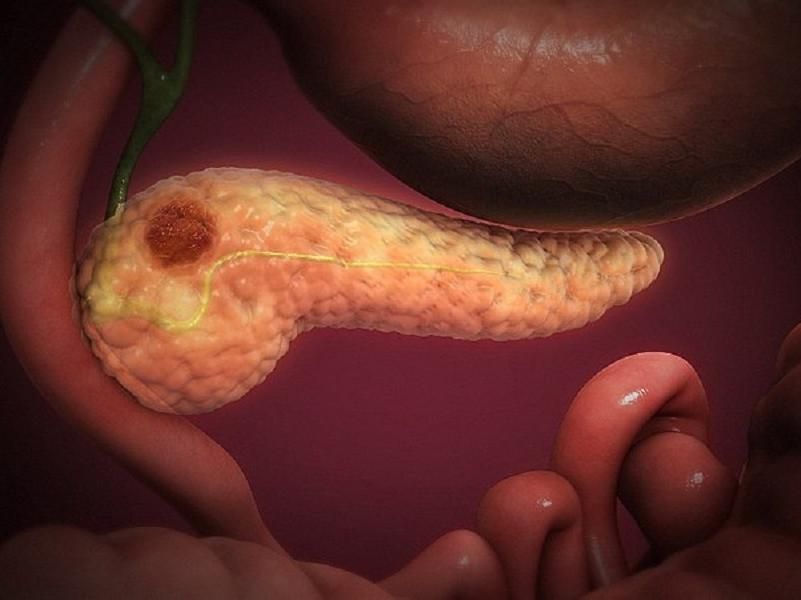New Biomarker Identified for Early Diagnosis of Pancreatic Cancer
CSIC scientists link the presence of AXL protein to early diagnosis of pancreatic tumors
A team co-led by CSIC researchers has identified a new biomarker for early diagnosis of the most common pancreatic cancer, pancreatic ductal adenocarcinoma, which is the third leading cause of cancer death in developed countries (in Spain there were about 8,700 cases in 2021). This work, published in eBioMedicine, associates the presence of the protein tyrosine kinase AXL with the detection of this type of tumor. This discovery is a breakthrough because it would allow detection through a blood test and because, until now, there is no biomarker for the early detection of pancreatic cancer.

Pancreatic cancer is the third leading cause of cancer death.
Creative Commons
The finding has been led by researchers from the Hospital del Mar Medical Research Institute (IMIM-Hospital del Mar) and the Barcelona Biomedical Research Institute (IIBB-CSIC), a CSIC center associated with the August Pi i Sunyer Biomedical Research Institute (IDIBAPS),
The study has analyzed the usefulness of the receptor tyrosine kinase AXL, a protein present on the surface of cells, to detect the presence of pancreatic cancer. This protein is usually absent in normal cells, but it has been shown that its presence is markedly increased in certain types of tumors, such as pancreatic cancer. "The AXL protein is a specific marker that tells us that malignant cells are already present. The fact that this marker is linked to the cell at the tumor stage gives it great importance because of its specificity for diagnosing pancreatic cancer," says Pilar Navarro, a researcher at IIBB-CSIC and IMIM-Hospital del Mar.
To demonstrate the diagnostic utility of this marker by means of a blood test, the researchers analyzed samples from more than 200 patients with chronic pancreatitis and pancreatic tumors. "In this way, they demonstrated the presence of the soluble AXL protein in blood as a marker in patients who had already developed the tumor, without being present in healthy individuals or in those suffering from chronic pancreatitis", emphasize Neus Martínez-Bosch, researcher at IMIM-Hospital del Mar, and Helena Cristóbal, from IIBB (CSIC-IDIBAPS), co-first authors of the study.
This finding makes it possible to advance in the detection of pancreatic cancer by identifying the tumor even in patients with pancreatitis, a pathology that can make diagnosis difficult. Thus, a new diagnostic marker is obtained, a very valuable tool, since the scarcity of markers means that only 20% of patients can be operated on in time, leading to metastasis and resistance to treatment.
Applying the diagnosis
This new marker represents a major innovation in the detection of a type of cancer for which there is no biomarker for early diagnosis. Currently, "CA19-9 protein is used only to assess response to treatment, but it cannot be used in diagnosis because of its low specificity. For this reason, the availability of a new tool is of particular relevance, especially considering that early diagnosis is essential for tumor surgery, the only curative treatment option," stresses Laura Visa, a doctor in the Medical Oncology Department at the Hospital del Mar.
The future of the study is related to the analysis of the patients who will benefit from this new marker, since a small number of pancreatic tumors do not express the AXL protein. However, the combination of the analysis of both CA19-9 and AXL proteins determines the presence of cancer cells with a sensitivity of 90 percent. "We are very interested in knowing why some cancers do not express AXL, this could give us clues to know how tumor mechanisms work that we could use as targets for treatments," concludes Pablo García de Frutos, researcher at the IIBB (CSIC-IDIBAPS).
Note: This article has been translated using a computer system without human intervention. LUMITOS offers these automatic translations to present a wider range of current news. Since this article has been translated with automatic translation, it is possible that it contains errors in vocabulary, syntax or grammar. The original article in Spanish can be found here.
Original publication
N. Martínez-Bosch, H. Cristóbal, M. Iglesias, M. Gironella, L. Barranco, L. Visa, D. Calafato, S. Jiménez-Parrado, J. Earl, A. Carrato, N. Manero-Rupérez, M. Moreno, A. Morales, C. Guerra, P. Navarro, P. García de Frutos; "Soluble AXL is a novel blood marker for early detection of pancreatic ductal adenocarcinoma and differential diagnosis from chronic pancreatitis."; eBioMedicine.






















































